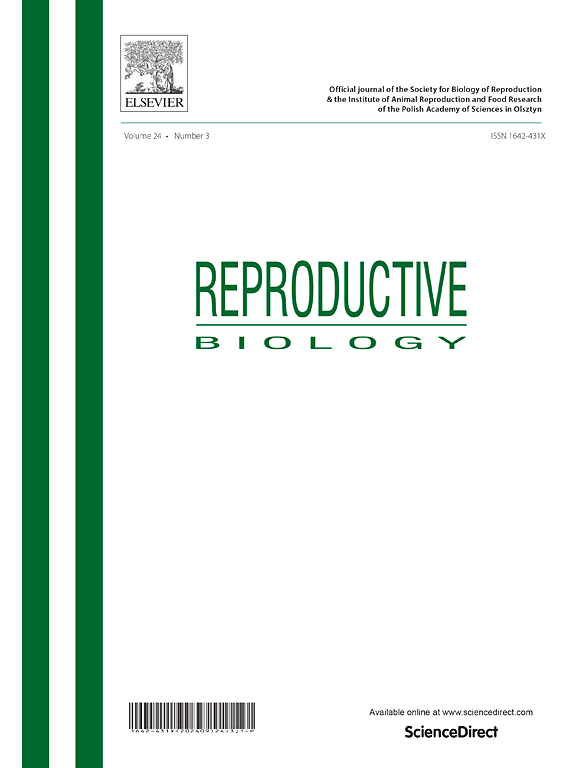Fucoxanthin attenuates LPS-induced endometritis via inhibiting inflammatory factors through the NF-κB pathway
IF 2.5
3区 生物学
Q3 REPRODUCTIVE BIOLOGY
引用次数: 0
Abstract
Endometritis is an infectious disease of the female reproductive system and commonly treated with antibiotics. However, the high resistance rates to antibiotics necessitate the urgent research for new and effective therapeutic strategies. The aim of this research is to explore the effect of fucoxanthin (FX) on endometritis through in vitro and in vivo assays. The effect of FX on inflammation was first explored in vitro using LPS-induced bovine endometrial epithelial (BEND) cell injury model. After the anti-inflammation effect of FX was confirmed in vitro, the effect of FX on endometritis was investigated in vivo using LPS-induced mice model. The female mice were randomly assigned into control, control + FX, LPS, and LPS + FX (100, 200 mg/kg) groups. The histological features of the uterus and expression levels of NF-κBp65 and inflammatory mediators (COX-2, iNOS, IL-1β, IL-6, and TNF-α) in the uterine tissue were compared among the animal groups. Our in vitro results showed that LPS induced BEND cell damage while significantly enhancing the expression of NF-κBp65 and inflammatory mediators (COX-2, iNOS, IL-1β, IL-6, and TNF-α). Nevertheless, pretreatment with FX reversed the abnormal phenomena caused by LPS. In vivo, LPS treatment resulted in obvious histopathological uterus damages, which were alleviated by FX treatment. Consistent with the in vitro assay, FX treatment also inhibited the expression of NF-κBp65 and inflammatory mediators in the animal experiments. Our study implies that FX is a potential therapeutic agent for endometritis. The beneficial function of FX on endometritis was achieved by inhibiting the inflammatory factors through the NF-κB pathway.
求助全文
约1分钟内获得全文
求助全文
来源期刊

Reproductive biology
生物-生殖生物学
CiteScore
3.90
自引率
0.00%
发文量
95
审稿时长
29 days
期刊介绍:
An official journal of the Society for Biology of Reproduction and the Institute of Animal Reproduction and Food Research of Polish Academy of Sciences in Olsztyn, Poland.
Reproductive Biology is an international, peer-reviewed journal covering all aspects of reproduction in vertebrates. The journal invites original research papers, short communications, review articles and commentaries dealing with reproductive physiology, endocrinology, immunology, molecular and cellular biology, receptor studies, animal breeding as well as andrology, embryology, infertility, assisted reproduction and contraception. Papers from both basic and clinical research will be considered.
 求助内容:
求助内容: 应助结果提醒方式:
应助结果提醒方式:


